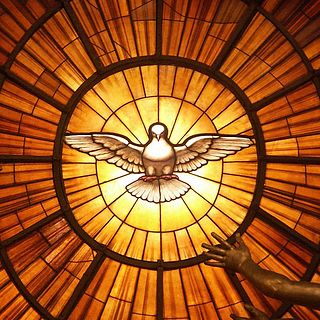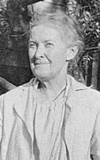
Speaking in tongues, also known as glossolalia, is an activity or practice in which people utter words or speech-like sounds, often thought by believers to be languages unknown to the speaker. One definition used by linguists is the fluid vocalizing of speech-like syllables that lack any readily comprehended meaning. In some cases, as part of religious practice, some believe it to be a divine language unknown to the speaker. Glossolalia is practiced in Pentecostal and charismatic Christianity, as well as in other religions.
Pentecostalism or classical Pentecostalism is a Protestant Charismatic Christian movement that emphasizes direct personal experience of God through baptism with the Holy Spirit. The term Pentecostal is derived from Pentecost, an event that commemorates the descent of the Holy Spirit upon the Apostles and other followers of Jesus Christ while they were in Jerusalem celebrating the Feast of Weeks, as described in the Acts of the Apostles.

Pentecost is a Christian holiday which takes place on the 50th day after Easter Sunday. It commemorates the descent of the Holy Spirit upon the Virgin Mary and the Apostles of Jesus Christ while they were in Jerusalem celebrating the Feast of Weeks, as described in the Acts of the Apostles.
Holy Roller or Holy Jumper are terms originating in the 19th century and used to refer to some Protestant Christian churchgoers in the Wesleyan-Holiness movement, such as Free Methodists and Wesleyan Methodists. The term describes dancing, shaking or other boisterous movements by church attendees who perceive themselves as being under the influence of the Holy Spirit.
The Azusa Street Revival was a historic series of revival meetings that took place in Los Angeles, California. It was led by William J. Seymour, an African-American preacher. The revival began on April 9, 1906, and continued until roughly 1915.

The International Pentecostal Holiness Church (IPHC) or simply Pentecostal Holiness Church (PHC) is an international Holiness-Pentecostal Christian denomination founded in 1911 with the merger of two older denominations. Historically centered in the Southeastern United States, particularly the Carolinas and Georgia, the Pentecostal Holiness Church now has an international presence. In 2000, the church reported a worldwide membership of over one million—over three million including affiliates.
The charismatic movement in Christianity is a movement within established or mainstream Christian denominations to adopt beliefs and practices of Charismatic Christianity with an emphasis on baptism with the Holy Spirit, and the use of spiritual gifts (charismata). It has affected most denominations in the US, and has spread widely across the world.
In Christian theology, baptism with the Holy Spirit, also called baptism in the Holy Spirit or baptism in the Holy Ghost, has been interpreted by different Christian denominations and traditions in a variety of ways due to differences in the doctrines of salvation and ecclesiology. It is frequently associated with incorporation into the Christian Church, the bestowal of spiritual gifts, and empowerment for Christian ministry. Spirit baptism has been variously defined as part of the sacraments of initiation into the church, as being synonymous with regeneration, or as being synonymous with Christian perfection. The term baptism with the Holy Spirit originates in the New Testament, and all Christian traditions accept it as a theological concept.

William Joseph Seymour was an African-American holiness preacher who initiated the Azusa Street Revival, an influential event in the rise of the Pentecostal and Charismatic movements. He was the second of eight children born to emancipated slaves and raised Catholic in extreme poverty in Louisiana.

Slain in the Spirit or slaying in the Spirit are terms used by Pentecostal and charismatic Christians to describe a form of prostration in which an individual falls to the floor while experiencing religious ecstasy. Believers attribute this behavior to the power of the Holy Spirit. Other terms used to describe the experience include falling under the power, overcome by the Spirit, and resting in the Spirit. The practice is associated with faith healing because individuals are often slain while seeking prayer for illness.

The Catholic Charismatic Renewal (CCR) is a movement within the Catholic Church that is part of the wider charismatic movement across historic Christian churches.
A shout is a kind of fast-paced Black gospel music accompanied by ecstatic dancing. It is sometimes associated with "getting happy".

Agnes Ozman (1870–1937) was a student at Charles Fox Parham's Bethel Bible School in Topeka, Kansas. Ozman was considered as the first to speak in tongues in the pentecostal revival when she was 30 years old in 1901. However, her experience, nevertheless valid, post dates the Shearer Schoolhouse Revival of 1896 near Murphy, NC., where the first documented mass outpouring of the Holy Ghost was said to have occurred; they spoke with new tongues there in a "Holy Ghost baptism" type of revival. Her experiences sparked the modern Pentecostal-Holiness movement, which began in the early 20th century.

The Apostolic Faith Mission of South Africa (AFM) is a classical Pentecostal Christian denomination in South Africa. With 1.2 million adherents, it is South Africa's largest Pentecostal church and the fifth largest religious grouping in South Africa representing 7.6 percent of the population. Dr. Isak Burger has led the AFM as president since 1996 when the white and black branches of the church were united. It is a member of the Apostolic Faith Mission International, a fellowship of 23 AFM national churches. It is also a member of the South African Council of Churches.

The Assemblies of God USA (AG), officially The General Council of the Assemblies of God, is a Pentecostal Christian denomination in the United States founded in 1914 during a meeting of Pentecostal ministers at Hot Springs, Arkansas, who came from a variety of independent churches and networks of churches. The Assemblies of God is a Finished Work Pentecostal denomination and is the U.S. branch of the World Assemblies of God Fellowship, the world's largest Pentecostal body. With a constituency of 2,928,143 in 2022, the Assemblies of God was the ninth largest Christian denomination and the second largest Pentecostal denomination in the United States.
The Bapticostal movement is a movement in some Baptist churches towards adopting certain elements of the charismatic movement. The word Bapticostal is a combination of Baptist and Pentecostal. The term has been used in a limited manner to describe a worship style of high-tempo Contemporary Christian music accompanied with spontaneous shouts, clapping and hand raising. But it also describes those churches where members profess to have and exhibit the charismatic gifts that are practiced in Pentecostalism such as speaking in tongues, being slain in the Spirit, or being granted a word of knowledge. The prevalence of such beliefs within Baptist churches worldwide is unknown. In some unions or conventions it hardly exists but in others it is common. In the United States, it has been estimated that among Southern Baptist churches, 5% of the churches could be classified as Bapticostal, and the numbers are growing. According to a study in 1989, 69% of Baptist churches belonging to the Baptist Union of New Zealand, the main Baptist association in New Zealand, identified positively with the charismatic movement.
Spiritual drunkenness refers to a phenomenon seen in some Christian denominations, particularly those associated with Pentecostalism and the Charismatic Movement, in which individuals who are said to be experiencing intense momentary visitations of—or even possession by—the Holy Spirit exhibit a range of behaviors resembling signs of moderate to severe alcoholic inebriation, including unsteadiness, uncontrollable laughter, silly expressions or gestures, verbal or nonverbal shouting, sudden intense fatigue, and temporary unconsciousness. The phenomenon typically occurs during Pentecostal and charismatic church services, usually at the prompting of a preacher or pastor, and most often involving multiple members of a congregation at a time, generally after having been "transferred" from one person to another via respiratory blowing or laying on of hands. It also can occur at more intimate settings including housegroups and fellowship meetings of believers, wherever the Holy Spirit is free to move and have His way. The experiences are meant to bring people into a deeper encounter of God's love, power, presence and joy. The result should be a positive one, leading one to a more holy and joyous life.
The term Holy Flesh movement is a derogatory term given to a brief but controversial religious movement within the Seventh-day Adventist Church from the late 1890s till 1901. They sought a physical demonstration of the "spirit" and shouted and prayed and sang until someone in the congregation would fall, prostrate and unconscious, from his seat. When the subject revived, he was counted among those who had passed through the "Gethsemane experience", had obtained holy flesh, and had translation faith. Thereafter, it was asserted, he could not sin and had obtained a form of immortal assurance. The doctrinal teachings of this movement regarding the nature of Christ's humanity is that he took the nature of Adam before the Fall.

The Swedish Pentecostal Movement is a Pentecostal movement in Sweden. Many, but not all, of these, are members of the Pentecostal Alliance of Independent Churches, which was founded in 2001. The Pentecostal movement spread to Sweden by 1907 from the 1904–1905 Welsh Revival and the Azusa Street Revival in Los Angeles in 1906.
Charismatic Christianity is a form of Christianity that emphasizes the work of the Holy Spirit and spiritual gifts as an everyday part of a believer's life. It has a global presence in the Christian community. Practitioners are often called Charismatic Christians or Renewalists. Although there is considerable overlap, Charismatic Christianity is often categorized into three separate groups: Pentecostalism, the Charismatic movement, and the Neo-charismatic movement.








